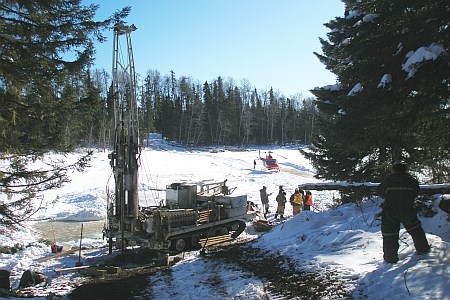Greg Rickford took considerable heat from leaders of two remote First Nation communities that feel they’ve been left out of the loop in discussions to industrialize the Far North.
At a Nov.21 assembly of Ontario Chiefs, Neskantaga’s Wayne Moonias and Eabemetoong’s Elizabeth Atlookan scolded the minister of energy, mines, northern development and Indigenous affairs for isolating them from talks surrounding the construction of roads into the Ring of Fire.
Rickford’s remarks about building a “corridor for prosperity” with road and hydro corridors to spin off regional economic development opportunities raised the anger of Atlookan, who felt the government isn’t taking into account her community’s concerns about the impact of mining on the land.
“You can’t say here it’s not about the Ring of Fire. Ultimately, that’s what this (north-south) road is all about,” she said.
”It’s not so much about us. It’s about prosperity. You’re cutting red tape so you can move this along real quickly.”
The communities are two of the five First Nations closest to the mineral deposits in the James Bay region. They are part of the nine member communities in the Matawa First Nations tribal council.
The two chiefs accused Rickford of repeatedly dodging them and being uncommunicative since the June provincial election. They claim his staff are meeting only with those communities that support natural resource development.
The Ford government appears to be following the same track as the previous Wynne government, which mothballed the Regional Framework Agreement negotiations, started in 2014, to focus on making headway on the access roads by working with more development-ready communities.
Two Ring of Fire-area First Nations, Webequie and Marten Falls, have approved road planning and environmental assessments on their traditional lands, that will support mining operations, as an avenue to lift their communities out of poverty and isolation.
In referencing Eabemetoong’s Supreme Court duty-to-consult victory against Ontario for a wrongly issued exploration permit to Landore Resources, Atlookan questioned how the government can be expected to advance a major industrial project without achieving consensus.
“It has to be a balanced approach, and I don’t think Eabametoong has ever said no to development,” she said. “Because two (First) Nations decide to build roads, you leave the rest of us out of the equation? I don’t think that’s fair.”
Rickford, who once worked as a nurse in the community, agreed with some of her comments, didn’t back down from the Ford government’s action-oriented approach to Far North development.
“I’m not going to apologize for the enthusiasm that our premier and this government has for creating opportunities in the North.”
Rickford said his job as cabinet minister is to “strike a balance” of different interests while acting for the good of the region and the province.
His focus is on identifying the more “pragmatic” infrastructure needs of each community and moving the process toward having individual First Nations or groups of communities work out agreements with resource companies.
“But I don’t think we’re there yet.”
In a stern lecture to Rickford, Moonias said for all the government’s pro-development talk, his community on the Attawapiskat River system has not been contacted to give consent to these natural resource projects.
He said the Regional Framework Agreement process they signed onto in 2014 ensured that their way of life, rights and interests on the land would be protected respectful dialogue “that’s not going to be rolled over for economic purposes.”
“We have not heard from the government that was recently elected if they have abandoned that process,” said Moonias.
“There’s an opportunity here to work on something that’s truly meaningful.”
Rickford responded the government is performing a review of the Regional Framework Agreement, but doesn’t think the three-year process has served all the participating Matawa communities well, since there’s no universal consensus on roads or development.
He further assured the chiefs his government pledges to work with First Nations as full partners on all major developments across the region and Ontario.




